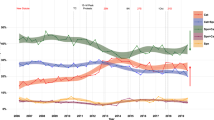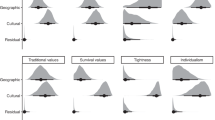Abstract
Can exposure to discernible economic benefits associated with the presence of a high-socioeconomic status immigrant group reduce xenophobic and antiforeigner attitudes? We explore this question using the case of Chinese internationals in the United States and an exogenous influx of foreign capital associated with their presence. Using a difference-in-differences design with panel data, along with analyses of pooled cross-sectional data, we find that immigration attitudes, as well as views towards China, became more positive over time among Americans residing in locales whose economies were stimulated by Chinese foreign investments. Our findings have implications for research on public attitudes towards immigration in an era of growing flows of high-socioeconomic status immigrants to the United States and other immigrant-receiving nations.
This is a preview of subscription content, access via your institution
Access options
Access Nature and 54 other Nature Portfolio journals
Get Nature+, our best-value online-access subscription
$29.99 / 30 days
cancel any time
Subscribe to this journal
Receive 12 digital issues and online access to articles
$119.00 per year
only $9.92 per issue
Buy this article
- Purchase on Springer Link
- Instant access to full article PDF
Prices may be subject to local taxes which are calculated during checkout




Similar content being viewed by others
Data availability
Replication data are available on the Harvard Dataverse at: https://doi.org/10.7910/DVN/GY8PXP.
Code availability
Replication code is available on the Harvard Dataverse at: https://doi.org/10.7910/DVN/GY8PXP.
References
Bansak, K., Hainmueller, J. & Hangartner, D. How economic, humanitarian, and religious concerns shape European attitudes toward asylum seekers. Science 354, aag2147 (2016).
Hainmueller, J. & Hopkins, D. J. The hidden American immigration consensus: a conjoint analysis of attitudes toward immigrants. Am. J. Polit. Sci. 59, 529–548 (2015).
Newman, B. J. & Malhotra, N. Economic reasoning with a racial hue: is the immigration consensus purely race neutral? J. Politics 81, 153–166 (2019).
Liao, S. Chinese Foreign Real Estate Investment and Voting in U.S. Presidential Elections https://doi.org/10.2139/ssrn.3504861 (SSRN, 2019).
Campbell, J. Y. & Cocco, J. F. How do house prices affect consumption? Evidence from micro data. J. Monet. Econ. 54, 591–621 (2007).
Mian, A., Rao, K. & Sufi, A. Household balance sheets, consumption, and the economic slump. Q. J. Econ. 128, 1687–1726 (2013).
Berger, D., Guerrieri, V., Lorenzoni, G. & Vavra, J. House prices and consumer spending. Rev. Econ. Stud. 85, 1502–1542 (2018).
Chaney, T., Sraer, D. & Thesmar, D. The collateral channel: how real estate shocks affect corporate investment. Am. Econ. Rev. 102, 2381–2409 (2012).
Charles, K. K., Hurst, E. & Notowidigdo, M. J. The masking of the decline in manufacturing employment by the housing bubble. J. Econ. Perspect. 30, 179–200 (2016).
Miller, N., Peng, L. & Sklarz, M. House prices and economic growth. J. Real Estate Financ. 42, 522–541 (2011).
Zonta, M. & Edelman, S. The Uneven Housing Recovery https://cdn.americanprogress.org/wp-content/uploads/2015/10/30051742/UnevenHousingRecovery-reportB.pdf (Center for American Progress, 2015).
Searcey, D. & Bradsher, K. Chinese cash floods U.S. real estate market. The New York Times https://www.nytimes.com/2015/11/29/business/international/chinese-cash-floods-us-real-estate-market.html (29 November 2015).
College towns: a roaring trade. The Economist http://www.economist.com/news/united-states/21700660-chinese-tiger-mums-start-college-town-housing-boom-roaring-trade (18 June 2016).
Kaushal, N. & Fix, M. The Contributions of High-Skilled Immigrants https://www.migrationpolicy.org/research/contributions-high-skilled-immigrants (Migration Policy Institute, 2016).
Hainmueller, J. & Hopkins, D. J. Public attitudes toward immigration. Annu. Rev. Polit. Sci. 17, 225–249 (2014).
Hangartner, D., Dinas, E., Marbach, M., Matakos, K. & Dimitrios, X. Does exposure to the refugee crisis make natives more hostile? Am. Polit. Sci. Rev. 113, 442–455 (2019).
Phillips, T. ‘This is just the start’: China’s passion for foreign property. The Guardian https://www.theguardian.com/cities/2016/sep/29/inside-china-passion-foreign-property-investment-uk (29 September 2016).
Rosen, K., Margon, A., Sakamoto, R. & Taylor, J. Breaking Ground: Chinese Investment in U.S. Real Estate https://asiasociety.org/files/uploads/66files/Asia (Asia Society, 2016).
Citrin, J., Reingold, B. & Green, D. P. American identity and the politics of ethnic change. J. Politics 52, 1124–1154 (1990).
Ha, S. E. The consequences of multiracial contexts on public attitudes toward immigration. Polit. Res. Q. 63, 29–42 (2010).
Hood, M. III & Morris, I. L. Brother, can you spare a dime? Racial/ethnic context and the Anglo vote on proposition 187. Social Sci. Q. 81, 194–206 (2000).
Hood, M. III & Morris, I. L. ‘Amigo o enemigo’: context, attitudes, and Anglo public opinion toward immigration. Social Sci. Q. 78, 309–323 (1997).
Hanson, G. H., Scheve, K. & Slaughter, M. J. Public finance and individual preferences over globalization strategies. Econ. Politics 19, 1–33 (2007).
Dancygier, R. M. Immigration and Conflict in Europe (Cambridge Univ. Press, 2010).
Lopez, M. H., Passel, J. & Rohal, M. Modern Immigration Wave Brings 59 Million to US, Driving Population Growth and Change Through 2065 http://www.pewhispanic.org/2015/09/28/modern-immigration-wave-brings-59-million-to-u-s-driving-population-growth-and-change-through-2065/ (Pew Research Center, 2015).
Liu, Y.-L. China’s Nouveau Riche Have Landed on America’s Campuses https://foreignpolicy.com/2015/09/01/chinas-nouveau-riche-have-landed-on-americas-campuses/ (Foreign Policy, 2015).
Green, D. P., Ha, S. E. & Bullock, J. G. Enough already about black box experiments: studying mediation is more difficult than most scholars suppose. Ann. Am. Acad. Pol. Soc. Sci. 628, 200–208 (2010).
Hankinson, M. When do renters behave like homeowners? High rent, price anxiety, and NIMBYism. Am. Polit. Sci. Rev. 112, 473–493 (2018).
Newman, B. J. Acculturating contexts and Anglo opposition to immigration in the United States. Am. J. Polit. Sci. 57, 374–390 (2013).
Tingley, D., Xu, C., Chilton, A. & Milner, H. V. The political economy of inward FDI: opposition to Chinese mergers and acquisitions. Chin. J. Int. Polit. 8, 27–57 (2015).
Enos, R. D. Causal effect of intergroup contact on exclusionary attitudes. Proc. Natl Acad. Sci. USA 111, 3699–3704 (2014).
Malhotra, N., Margalit, Y. & Mo, C. H. Economic explanations for opposition to immigration: distinguishing between prevalence and conditional impact. Am. J. Polit. Sci. 57, 391–410 (2013).
Pardos-Prado, S. & Xena, C. Skill specificity and attitudes toward immigration. Am. J. Polit. Sci. 63, 286–304 (2019).
Citrin, J., Green, D. P., Muste, C. & Wong, C. Public opinion toward immigration reform: the role of economic motivations. J. Politics 59, 858–881 (1997).
Pérez, E. O. Explicit evidence on the import of implicit attitudes: the IAT and immigration policy judgments. Polit. Behav. 32, 517–545 (2010).
Wright, M., Levy, M. & Citrin, J. Public attitudes toward immigration policy across the legal/illegal divide: the role of categorical and attribute-based decision-making. Polit. Behav. 38, 229–253 (2016).
Mansfield, E. D. & Mutz, D. C. Support for free trade: self-interest, sociotropic politics, and out-group anxiety. Int. Organ. 63, 425–457 (2009).
Page, B. I. & Xie, T. Living with the Dragon: How the American Public Views the Rise of China (Columbia Univ. Press, 2010).
Newman, B. J., Shah, S. & Collingwood, L. Race, place, and building a base: Latino population growth and the nascent Trump campaign for president. Public Opin. Q. 82, 122–134 (2018).
Stokes, B. Republicans, Especially Trump Supporters, See Free Trade Deals as Bad for U.S. https://www.pewresearch.org/fact-tank/2016/03/31/republicans-especially-trump-supporters-see-free-trade-deals-as-bad-for-u-s/ (Pew Research Center, 2016).
Partisans Have Starkly Different Opinions About How the World Views the U.S. https://www.people-press.org/2017/11/09/partisans-have-starkly-different-opinions-about-how-the-world-views-the-u-s/ (Pew Research Center, 2017).
Conflicting Partisan Priorities for U.S. Foreign Policy https://www.people-press.org/2018/11/29/conflicting-partisan-priorities-for-u-s-foreign-policy/ (Pew Research Center, 2018).
The Pew Research Center for the People & the Press Poll Database https://www.people-press.org/question-search/?qid=1926220&pid=51&ccid=50#top (Pew Research Center, 2018).
2016 Profile of International Activity in U.S. Residential Real Estate https://www.nar.realtor/sites/default/files/reports/2016/2016-profile-of-international-home-buying-activity-06-06-2016.pdf (National Association of Realtors, 2016).
Leng, S. & Wertime, D. China’s Anti-Corruption Campaign Ensnares Tens of Thousands More http://foreignpolicy.com/2015/01/09/chinas-anti-corruption-campaign-ensnares-tens-of-thousands-more/ (Foreign Policy, 2015).
Visualizing China’s Anti-Corruption Campaign http://www.chinafile.com/infographics/visualizing-chinas-anti-corruption-campaign (ChinaFile, 2017).
Prasad, E. S. Gaining Currency: The Rise of the Renminbi (Oxford Univ. Press, 2016).
U.S. Targets Money Laundering in All-Cash Home Sales in Miami, Manhattan http://reut.rs/1UPpGty (Reuters, 2016).
Wilcox-Archuleta, B. The treatment works: revisiting a key link in contextual theories of political behavior. Res. Politics 5, https://doi.org/10.1177%2F2053168018768672 (2018).
Ansolabehere, S. & Schaffner, B. F. Does survey mode still matter? Findings from a 2010 multi-mode comparison. Polit. Anal. 22, 285–303 (2014).
Acknowledgements
S.L. received funding from the Hellman Foundation for this work. The funders had no role in study design, data collection and analysis, decision to publish or preparation of the manuscript.
Author information
Authors and Affiliations
Contributions
S.L., N.M. and B.J.N. conceived the research, designed the analyses, conducted the analyses and wrote the manuscript.
Corresponding author
Ethics declarations
Competing interests
The authors declare no competing interests.
Additional information
Peer review information Primary Handling Editor: Aisha Bradshaw.
Publisher’s note Springer Nature remains neutral with regard to jurisdictional claims in published maps and institutional affiliations.
Supplementary information
Supplementary Information
Supplementary Fig. 1 and Supplementary Tables 1–14.
Rights and permissions
About this article
Cite this article
Liao, S., Malhotra, N. & Newman, B.J. Local economic benefits increase positivity toward foreigners. Nat Hum Behav 4, 481–488 (2020). https://doi.org/10.1038/s41562-020-0828-7
Received:
Accepted:
Published:
Issue Date:
DOI: https://doi.org/10.1038/s41562-020-0828-7



